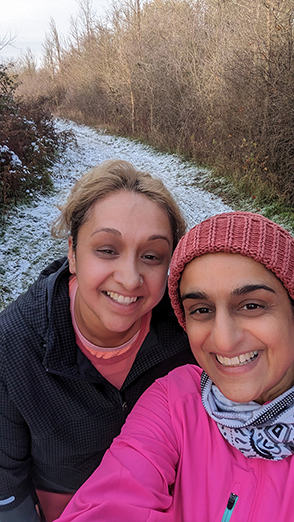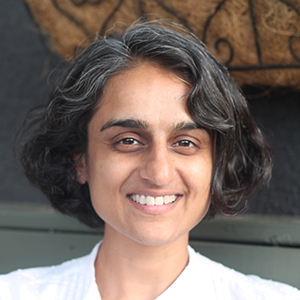
Guiding my sister through cancer
My sister, Sukhy, was diagnosed with breast cancer just before the pandemic and went through surgery, chemo and radiation therapy while navigating COVID-19 precautions. She had just been given the all-clear when, in August 2022, we learned the reason for her continuing chest pain: Her cancer had metastasized. Tumors had spread to her liver and bones. The doctors told us her disease was now incurable.

As a scientist and communicator, I made it my mission to help Sukhy understand her disease. Along with my husband David, a cancer researcher, I immediately started scouring the internet for information on secondary breast cancer and treatment options. I moved back to the U.K. to support her and my family and started attending as many of her hospital appointments as I could.
We knew that her diagnosis meant Sukhy would be on treatment for the rest of her life. This news came with a barrage of information, but little I — or any of us — could control. However, I can help her understand what’s happening to her body and how the therapies work. I can reassure her that, thanks to the complexities of biology, certain test results don’t always mean bad news.
When I go with her to appointments, I’ve noticed that physicians sometimes share incorrect information or appear to misunderstand the underlying biology. For example, Sukhy was being recruited for a clinical trial involving a targeted antibody-conjugated chemotherapy. She asked her oncologist whether hair loss might be one of the side effects. The oncologist replied sadly that, yes, it would. I had read through the paperwork for the trial, and I knew the benefits of this treatment are reduced side effects thanks to its specificity for a particular protein.
I was frustrated and I wanted to correct the doctor. As a communicator, I always want to supply people with the best information possible. But is that always necessary?
Stepping back, I considered what was most important in this situation: I wanted my sister to receive the best care possible and leave an appointment feeling positive.
So, I could point out that this doctor is not up to date with the research or argue about her treatment options. But would that change the standard of care? No. In fact, it might leave Sukhy feeling anxious or stressed about her care team, undermining my goal.
On days she’s upset about the progression of her disease, Sukhy’s not interested in a TED talk on tumor evolution. She needs comfort. On those days, I’m there with hugs in place of words.
I will always advocate for my sister and explain concepts she doesn’t understand. I would never knowingly omit information I thought she needed. But considering the bigger picture, sometimes there’s greater value in what I choose not to say.
Enjoy reading ASBMB Today?
Become a member to receive the print edition four times a year and the digital edition monthly.
Learn moreGet the latest from ASBMB Today
Enter your email address, and we’ll send you a weekly email with recent articles, interviews and more.
Latest in Opinions
Opinions highlights or most popular articles

Sketching, scribbling and scicomm
Graduate student Ari Paiz describes how her love of science and art blend to make her an effective science communicator.

Embrace your neurodivergence and flourish in college
This guide offers practical advice on setting yourself up for success — learn how to leverage campus resources, work with professors and embrace your strengths.

Survival tools for a neurodivergent brain in academia
Working in academia is hard, and being neurodivergent makes it harder. Here are a few tools that may help, from a Ph.D. student with ADHD.

Hidden strengths of an autistic scientist
Navigating the world of scientific research as an autistic scientist comes with unique challenges —microaggressions, communication hurdles and the constant pressure to conform to social norms, postbaccalaureate student Taylor Stolberg writes.

Black excellence in biotech: Shaping the future of an industry
This Black History Month, we highlight the impact of DEI initiatives, trailblazing scientists and industry leaders working to create a more inclusive and scientific community. Discover how you can be part of the movement.

Attend ASBMB’s career and education fair
Attending the ASBMB career and education fair is a great way to explore new opportunities, make valuable connections and gain insights into potential career paths.

